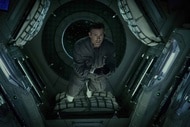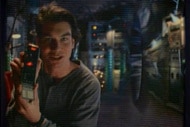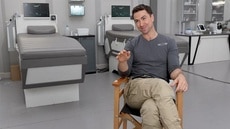Create a free profile to get unlimited access to exclusive videos, sweepstakes, and more!
This company wants to deliver a baby in space and prepare humanity for a life beyond Earth

What happens when Earth's resources run out? Well, if science fiction has taught us anything, it's that humanity will seek a new and habitable planet somewhere in the cosmos on which to keep the species going in perpetuity. When that day comes, we'll need a viable way to procreate and deliver children in the vastness of outer space.
Enter SpaceLife Origin, a one-of-a-kind tech company that is seeking to make it possible for humans to give birth in the vacuum of space by 2024, a goal titled "Mission Cradle." While that is its ultimate goal, SpaceLife is also striving to become the first company to "safe-guard human ‘Seeds-of-Life’ in space [Mission Ark] by 2020 [and] make embryo conception in space feasible [Mission Lotus] by 2021," according to its official website.
The gallery below offers a glimpse at the patent-pending "Ark" designs. Vials of human DNA will be protected within the radiation-shielded spheres that are to be kept on Earth and satellites surrounding the planet. SpaceLife Origin describes this as an insurance policy for the continuation of mankind in case a catastrophe hits and we need to leave in a hurry.
"If humanity wants to become a multi-planetary species, we also need to learn how to reproduce in space," writes CEO, Kees Mulder, on the site. “SpaceLife Origin is thrilled to announce its Missions Program to enable sustainable life beyond earth. A world’s first and truly unique critical step in the future of mankind. We believe that any space company, agency, or nation with ambitions for settlements on other planets will benefit from partnering with us for the successful execution and completion of their own plans."
It's like Mulder (basically a 21st-century Noah) saw Sky Captain and the World of Tomorrow and Alien: Covenant and decided to make them a reality. Don't get us wrong, this is an awesome concept that is slowly turning science fiction into science fact, which may just save our species one day in the future, whether we decide to head to the Moon, to Mars, or beyond. And it's not just about protecting our collective DNA, Jurassic Park-style; it's also about seeing the effects of low orbit on a developing embryo (later to be returned to a womb on Earth) and making it possible to go through labor in zero gravity.
“It’s a small step for a baby, but a giant baby-step for mankind,” says Dr. Egbert Edelbroek, SpaceLife Origins Chief Strategy & Innovation Officer, on the company's website. "During a 24-36 hour mission a woman will give birth at 250 miles above Earth, accompanied by a trained, world-class medical team. A carefully prepared and monitored process will reduce all possible risks, similar to western standards as they exist on Earth for both mother and child."
Just so you know, if any suspicious, Michael Fassbender-looking androids, waiting to impregnate us with Xenomorphs, are aboard the escape vessels leaving Earth, we ain't getting on them.
(Image from 2001: A Space Odyssey courtesy of MGM.)


























